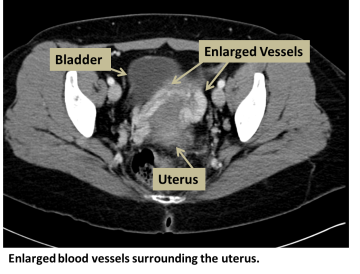Pelvic Congestion Syndrome
Find your care
Our board-certified physicians diagnose and treat many vascular conditions. Call 310-481-7545 to learn more about interventional radiology services.
What is pelvic congestion syndrome?
Pelvic congestion syndrome (PCS) is an abnormal enlargement of veins (varicose veins) in the pelvis, including around the ovaries. Normally, veins bring deoxygenated blood back to the heart, but when the blood cannot flow properly, blood builds up and causes veins to dilate. Disruption in blood flow can result from problems with or missing valves in the veins or compression from a tumor or other blood vessels. PCS can also occur because of pregnancy. PCS does not occur during menopause because women in menopause have less estrogen, and estrogen dilates veins. The enlarged veins in PCS are similar to other varicose veins that occur in the legs.
PCS affects up to 30% of women with chronic pelvic pain for which there is no other identifiable cause. Some women will have enlarged pelvic veins, but they will not be diagnosed with PCS unless there is chronic pelvic pain for at least six months.

Risk Factors
- Pregnancy, especially after multiple pregnancies
- Increased estrogen
Symptoms
- Chronic pelvic pain that does not cycle, unlike pain with menstrual cramps
- Dull, aching pain or heaviness, but may occasionally have sharp pain
- Pain worse when upright or as day progresses
- Pain worse during menstrual periods
- Pain worse during or after sexual intercourse
- Varicose veins in pelvis more common on left side
- Not usually visible because varicose veins are usually around the ovaries
- Varicose veins may rarely appear on the buttocks, thighs, and vulva
Diagnosis
The physician will perform a physical exam of the pelvic region. In addition, the physician will look for varicose veins using:
- Ultrasound
- MRI
- CT scan
- Venography (X-ray with contrast agent to visualize veins)
Treatments
Patients with symptoms can undergo an outpatient procedure known as embolization. A thin catheter is inserted into the femoral vein and guided to the enlarged pelvic veins by X ray guidance. Tiny coils are placed in the enlarged pelvic veins, and a sclerosing agent is injected to seal the vein. Patients can resume normal daily activities immediately.
For More Information:
For more information or to schedule an appointment with one of our IR physicians, please call 310-481-7545.